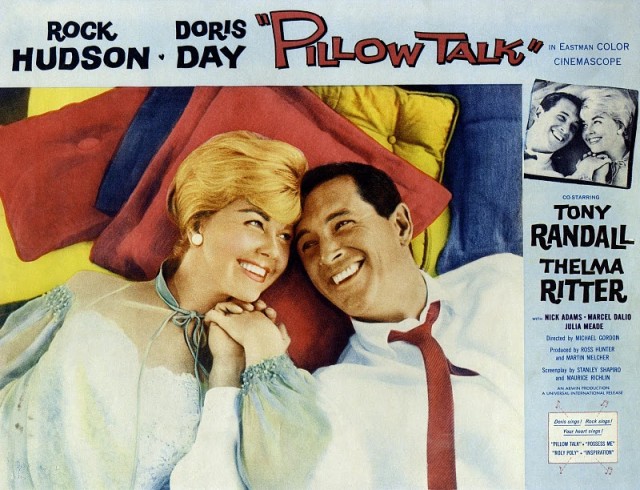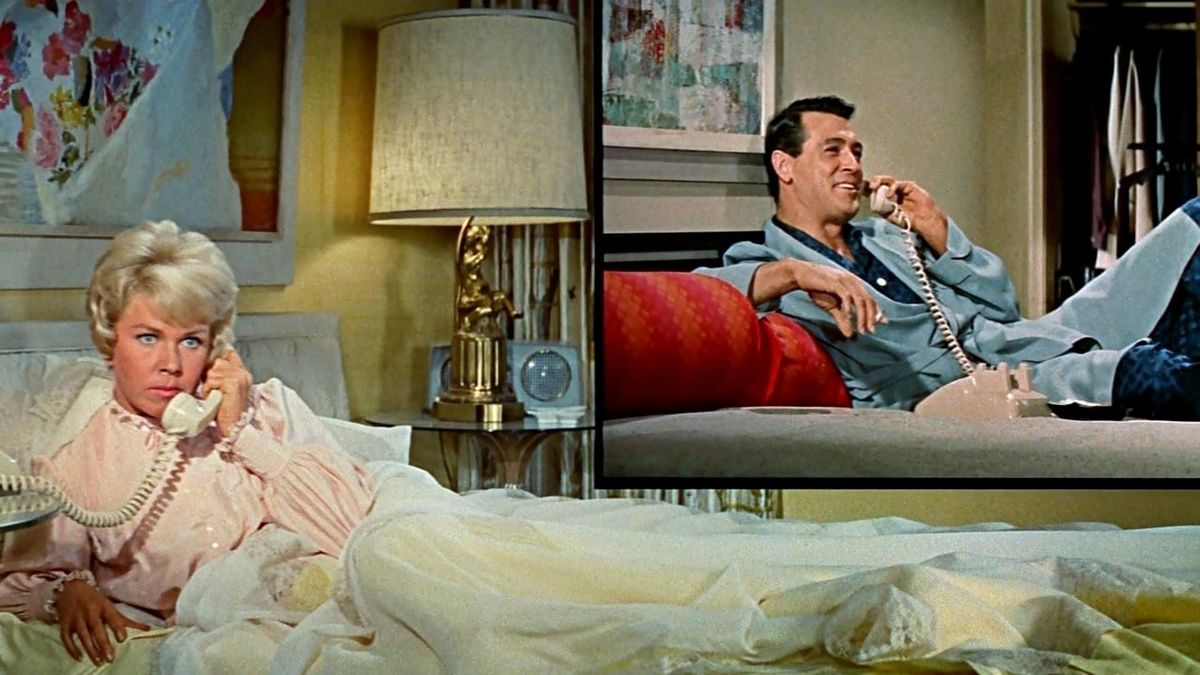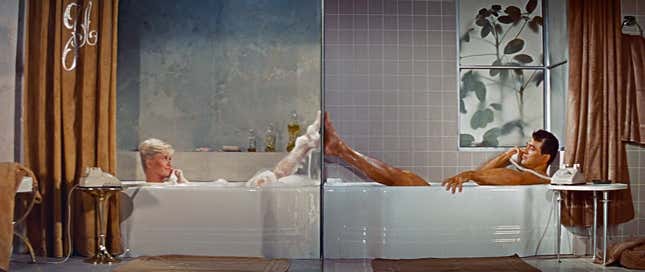Grade-A Fluff: Let's Talk "Pillow Talk"
Sometimes we love things that are bad for us; other times, we love media that stimulates our intellect. And for me, somewhere between the two ends of the spectrum lies Pillow Talk, directed by Michael Gordon and starring Doris Day and Rock Hudson. It’s gloriously kitschy, zippy, groan-inducing, and not exactly empowering for women. I find it fascinating, impressionable, and despite its copycats, unique.
Day plays Jan Morrow, a decorator with no marriage prospects on the horizon—but a beautiful apartment, a job she loves, and independence she claims to enjoy. Hudson plays Brad Allen, a successful songwriter who woos multiple women with a single song. The two first cross paths vocally: they share the same party line, which means that if one of them is already on the phone, the other one cannot make or receive calls. Jan is sick of missing calls from work because Brad is busy serenading women with the same song over and over. Brad is sick of Jan insisting on using the line while he’s busy serenading women with the same song over and over. Clearly, a battle between the sexes is brewing. [spoilers here on out and tw: mentions of attempted sexual assault and 1959]
Brad and Jan run into each other in person on separate dates—she happens to be gorgeous, which he failed to anticipate. Thanks to mutual friend Jonathan (Tony Randall), who’s crushing on Jan, Brad knows that he can’t win Jan over if he reveals his true identity. So he pretends to be Rex the Rich Texas Oil Baron and rescues her from her terrible date. Jan’s thrilled to find a handsome gentleman who treats her like a lady. Of course, Brad gets found out before she sleeps with him. But all he has to do is hire Jan to redecorate his apartment (and then kidnap her from her bed) and she’ll realize that he’s in love with her, right?
If “1959” was a punchline à la The Aristocrats comedy routine, I nominate the entire plot of Pillow Talk as its set-up.
This isn’t quite fair to 1959, which after all couldn’t have known what the 60s would become (and indeed might have clutched November and December to its worried bosom). But PT was a trailblazer when it came to movies that revolve around sex without letting its characters engage in sex. In terms of plot, it isn’t revolutionary; male characters adapting a pseudonym to seduce women date at least back to the Arthurian legend. The best you can say about PT is that it found the most colorful euphemisms for sex first, and copycats trying to recreate its zingers ought to have the decency to look embarrassed.
Its real treat is the cast, who all know exactly what movie they’re in and play their roles to the hilt. Day is smart, warm, and self-righteous in her role as Jan, a woman who’s not on the make but still believes in love. Hudson vacillates between smarm and charm, gamely playing into the light slapstick his character is faced with and delivering a comical Texas-cum-Hollywood accent. Peppering the proceedings is the spice that is Tony Randall, pitch-perfect in his role of a wannabe alpha who finds he enjoys being the omega. There are others: Nick Adams as a detestable frat boy who can’t hold his liquor; Thelma Ritter as Day’s amoral, likable maid; and Perry Blackwell, a lounge singer who impishly admonishes Brad for his deception via song.
I like a lot of aspects of PT. Over multiple re-watches, I’ve paid attention to the framing of the narrative, to the language of film, and to the dialogue that isn’t there. Often, audiences read frigidness in Day’s Jan: she doesn’t appear to enjoy male attention and becomes defensive when Hudson’s Brad crudely suggests she is obsessed with his sex life (she’s accused of suffering from “bedroom problems,” i.e., vibrators don’t exist yet). Indeed, every character except Jonathan expresses, to Jan’s face, inappropriate curiosity or snide conviction about how much or how little she puts out. Adams’ Tony, after attempting to force himself onto Jan, justifies plying her with alcohol because she is “an emergency.” Thelma’s Alma tells her she’s “missing it,” i.e., an active sex life. Even the executive at the phone company talks in code about Jan’s love life when she makes a formal complaint about Brad’s line-hogging antics. No wonder this woman isn’t enjoying single life—she’s being constantly judged by everyone.
It’s not that Brad is necessarily sleazy by comparison. He is not judged for his sexual appetite—every partner is a swooning, willing participant, starkly contrasted with Jan having to fight off Tony in his car. Brad rejects marriage more profusely than Jan does. “Before a man gets married, he’s like a tree in the forest,” he explains to Jonathan. “He stands there independent … and then he’s chopped down, his branches are cut off, he’s stripped of his bark and he’s thrown into the river with the rest of the logs.” The thrice-divorced, pompous Jonathan cannot mount a counterargument.
But once Brad hatches the plan to seduce Jan, a new side of him emerges. As the soft-spoken Rex, Brad’s seduction routine is in fact based on a lack of sex. At one point, he innocently invites the wary Jan up to his apartment just to see the view, and then just as innocently escorts her back out. Brad-on-the-phone acts as Jan’s Iago, suggesting that Rex’s intentions are dubious. Later, as Brad, he suggests that the gentlemanly Rex is not heterosexual (“What a vicious thing to say!” Jan exclaims, a 1959 thing to say*), which Brad-as-Rex uses to convince Jan to spend a weekend alone with him. Interestingly, Jan agreeing to go with him implies that she’s fine with sex as a single girl. Brad pushes the double-act to a cruel limit; paradoxically, by spending time with her outside of his push-button apartment, he gets to know her and in turn falls for her.
This is a subtle point that the film doesn’t linger on. Why does Brad genuinely, desperately pursue Jan after his true identity is revealed? Because it’s a new dynamic that injects fresh energy into the movie. I for one take pleasure in Jan’s righteous anger and Brad’s contrition—as does Jonathan, who helps and hinders Brad’s apologetic wooing on a whim. Jan is manipulated by her boss to take Brad on as a client, an idea that Alma came up with because she approves of him. Brad heavily hints to Jan that he’s ready to be domesticated. What spurred this change? Perhaps it is Jan’s parting words as she leaves the getaway cabin, luggage packed and an indignant Jonathan waiting outside: “At least my problems can be solved in one bedroom. You couldn’t solve yours in a thousand!” And just like that, Brad is a log looking for his mill.
PT will never be mistaken for subversive feminist filmmaking, but I argue that there are subtle details that lessen its misogynistic overtones. For one thing, while the women Brad dates are interchangeable, the movie doesn’t paint them as promiscuous. Jan doesn’t slut-shame them; all her resentment is reserved for Brad’s trickery. Likewise, it’s not explicitly stated that Jan is a virgin waiting for marriage. The two men who show interest in her before Brad does, Tony and Jonathan, are no prizes; Tony tries to take advantage of her and Jonathan makes her feel uncomfortable with his extravagant gifts. These are the kind of men she has to choose from—no wonder she’s picky about who she sleeps with.
Where I have the most trouble with this film is the ending, where Brad goes all caveman on Jan, carrying her across town because he’s angry at the state of his redecorated apartment. To go along with this, we have to believe that this anger is born out of love—a harder sell in post-2020 than in 1959. They fight until Brad mentions the “m” word and Jan, overjoyed that her two-faced ex-boyfriend is ready for commitment, quickly pushes an automatic lock button to stop a furious Brad from leaving. In a small way, they both exercise control over one another—and they both laugh gaily as their righteous indignation melts away.
Like all movies, what you bring with you when you watch Pillow Talk will dictate what you take away from it. If you’re more of an Alma, you’ll see Jan as a prudish goody-good. If you see Jan’s objection to Brad as reasonable, you might dislike Brad more than the movie wants you to. But its appeal is mostly in its aesthetic: a bright, plastic period piece best appreciated on its most superficial level.
Other Hudson-Day offerings:
Lover Come Back: A shameless rehash of PT’s fake-identity plot, Hudson pretends to be a meek virgin to entice rival ad exec Day and throw her off the scent of a fake ad account. It is truly more absurd than it sounds. There’s a cantankerous reclusive scientist, more slapstick (Tony Randall gets in on the act, and thank God), and bizarre running gags about Hudson’s sexuality and Day’s sexual inexperience. Somehow, it’s both better and worse than its predecessor.
Send Me No Flowers: Once again, Hudson must hide a secret from Day, a substantial feat considering that their characters are actually married in this one. But Hudson shares his best scenes with Randall, who again proves to be essential—otherwise, the movie is a snooze-fest. Instead, watch Randall in Boys’ Night Out and Day in her WB era, when she was paired with the rubbery but appealing Jack Carson.
*This could be seen as an insult directed at Jan, as it implies that the only kind of man she can hope to catch is a gay man who uses her as a beard.





Comments
Post a Comment